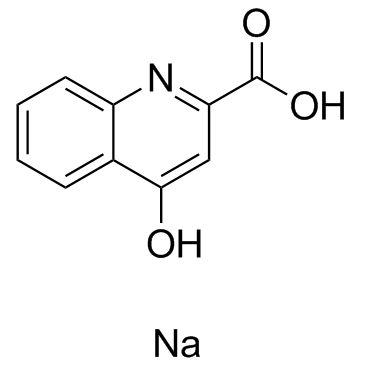Kynurenic acid sodium |
| Catalog No.GC36411 |
Products are for research use only. Not for human use. We do not sell to patients.

Cas No.: 2439/2/3
Sample solution is provided at 25 µL, 10mM.
Kynurenic acid sodium, an endogenous tryptophan metabolite, is a broad-spectrum antagonist targeting NMDA, glutamate, α7 nicotinic acetylcholine receptor. Kynurenic acid sodium is also an agonist of GPR35/CXCR8. CXCR8
GPR35 functions as a receptor for the kynurenine pathway intermediate kynurenic acid. Kynurenic acid elicits calcium mobilization and inositol phosphate production in a GPR35-dependent manner in the presence of G qi/o chimeric G proteins. Kynurenic acid stimulates [35S]guanosine 5′-O-(3-thiotriphosphate) binding in GPR35-expressing cells, an effect abolished by pertussis toxin treatment. Kynurenic acid also induces the internalization of GPR35[1]. KYNA's neuroinhibitory qualities and its neuroprotective and anticonvulsant effects are discovered using concentrations of the compound in the millimolar range. This, as well as the low affinity of KYNA at each of the three ionotropic glutamate receptors responsible for these effects [NMDA, alpha-amino-3-hydroxy-5-methyl-4-isoxazole propionic acid (AMPA) and kainate], together with the realization that KYNA concentrations in the mammalian brain are in the sub-micromolar range, suggested that other receptors might serve as targets of endogenous Kynurenic acid. Kynurenic acid, with a shallower inhibition curve and non-competitively, antagonizes α7nAChRs on cultured hippocampal neurons with an IC50 in the low micromolar range[2].
Kynurenic acid affects the activity of leukocytes in the peripheral blood of mice, although the lowest one (2.5 mg/L) has the most profound influence in contrast to the highest one (250 mg/L), which produces the weakest effect. The lowest Kynurenic acid dose stimulates the proliferative response of T lymphocytes (p<0.05), after 7 and 28 days of administering the acid to the animals[3].
[1]. Wang J, et al. Kynurenic acid as a ligand for orphan G protein-coupled receptor GPR35. J Biol Chem. 2006 Aug 4;281(31):22021-8. [2]. Albuquerque EX, et al. Kynurenic acid as an antagonist of α7 nicotinic acetylcholine receptors in the brain: facts and challenges. Biochem Pharmacol. 2013 Apr 15;85(8):1027-32. [3]. Ma?aczewska J, et al. Effect of oral administration of kynurenic acid on the activity of the peripheral blood leukocytes in mice. Cent Eur J Immunol. 2014;39(1):6-13.
Average Rating: 5 (Based on Reviews and 18 reference(s) in Google Scholar.)
GLPBIO products are for RESEARCH USE ONLY. Please make sure your review or question is research based.
Required fields are marked with *




















